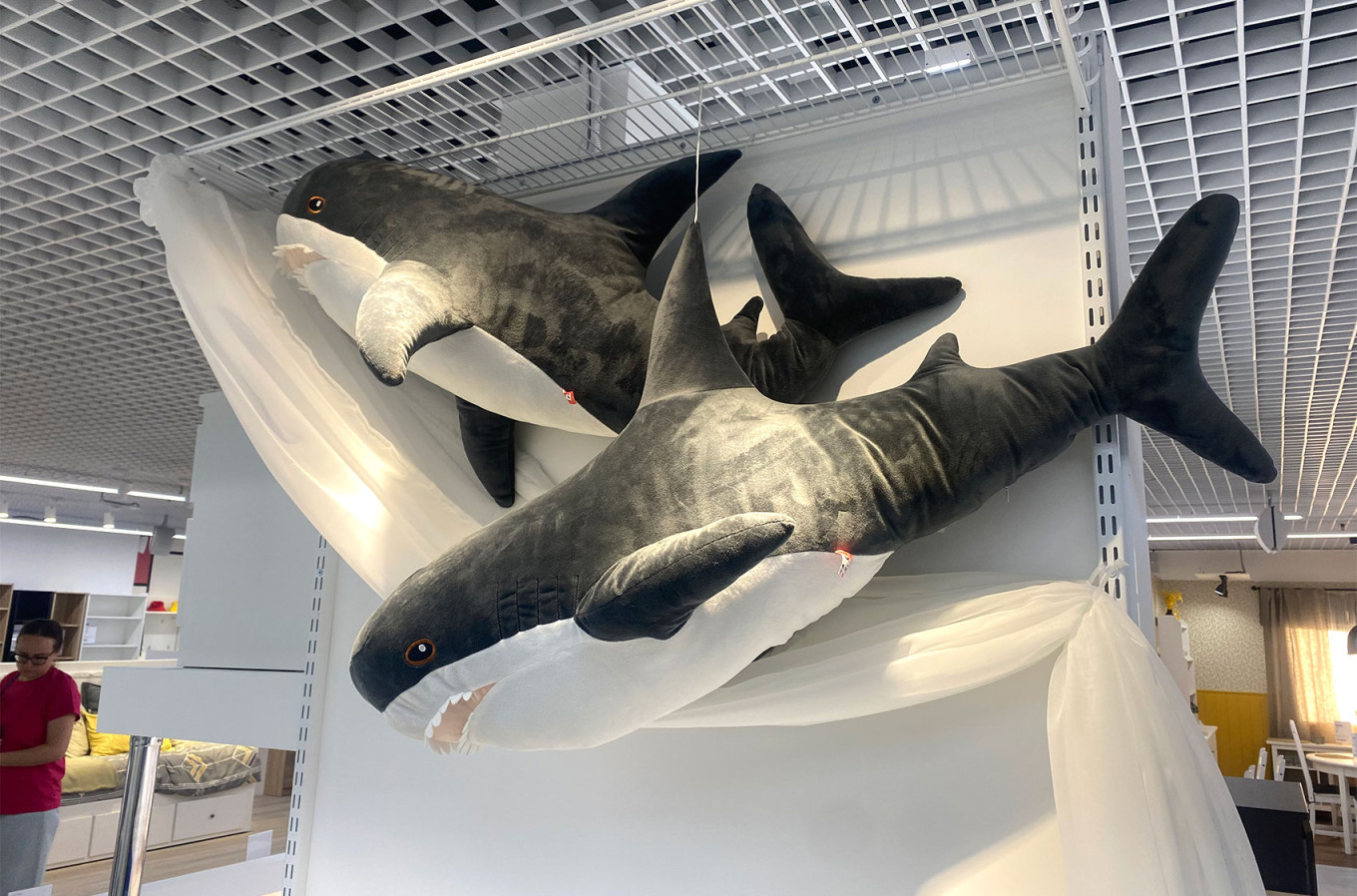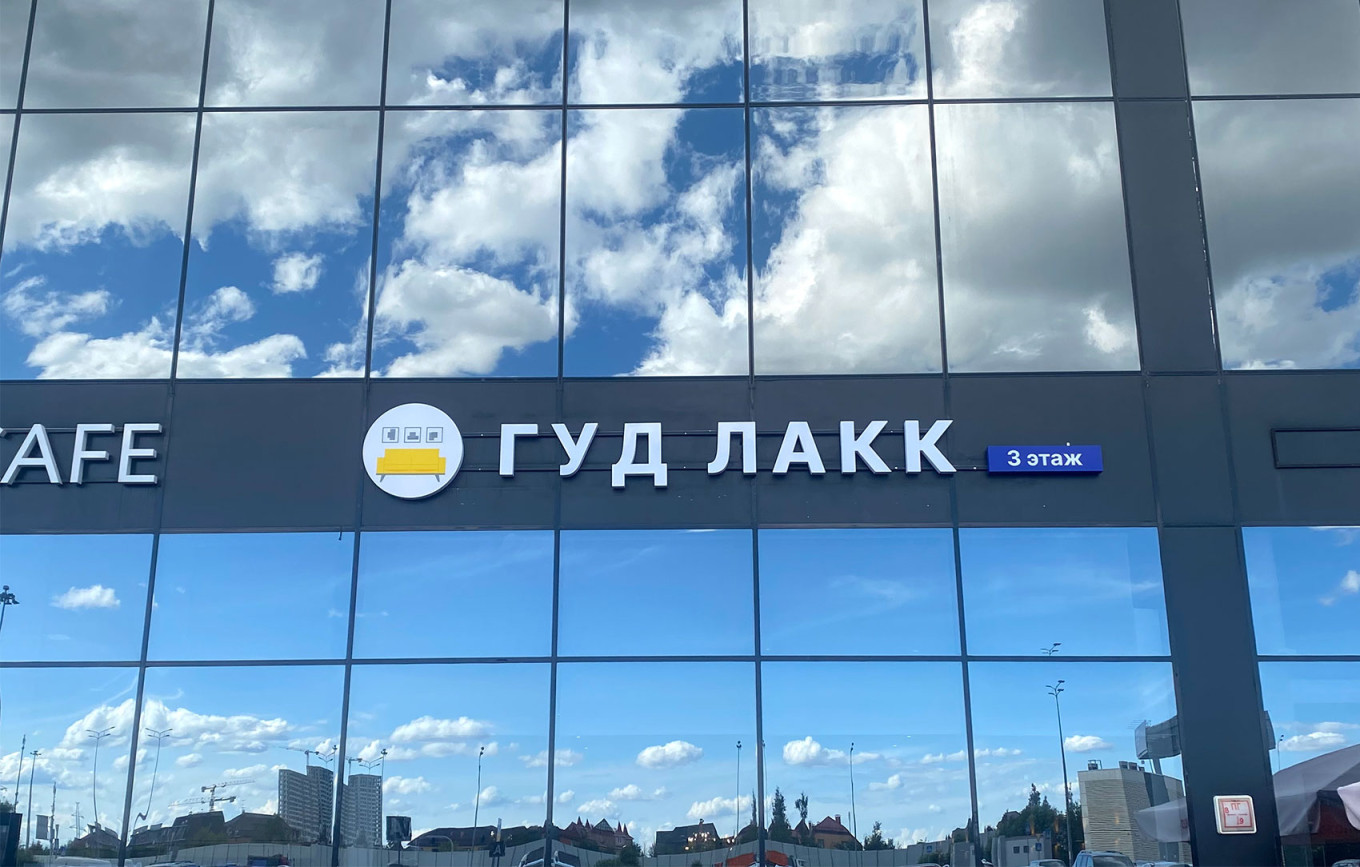MOSCOW — With its blue-and-yellow branding and stuffed sharks adorning the entrance, it’s easy to recognize what this small store in a shopping mall located in southwest Moscow is aiming for.
Гуд Лакк (“Good Luck” in Cyrillic letters), which opened earlier this month, is in many ways a carbon copy of IKEA, the Swedish furniture giant which pulled out of Russia last year following the outbreak of conflict in Ukraine.
Many of the furniture items displayed in Good Luck’s pre-arranged rooms — including chairs, tables and bookshelves — are nearly indistinguishable from those sold at IKEA. And the Swedish store’s signature plush sharks have also made a nostalgic comeback at the Russian copycat.
As shoppers enter Good Luck, they are greeted with a children’s room decorated in pink tones, evoking the ambiance of a young girl’s bedroom. Customers walking around remarked that they would have preferred a more gender-neutral or diverse approach in decor. The price tag shows that the whole room costs 90,000 rubles ($992).
Old Russian penmanship exercise books are displayed on the desk in the children’s room, while the shelves in the living room are decorated with Soviet dictionaries — reminders that Good Luck is not quite a carbon copy of the Swedish store on which it models itself.
Despite the apparent similarities, customers told The Moscow Times that this Russian clone falls short of the high standards set by the brand it seeks to emulate.
Natalya, a customer who declined to give her surname, said that she was disappointed by her visit to the store, saying the furniture was completely different in quality than IKEA’s.
“This is not IKEA — period,” she said.

For more than 20 years, Russians looking for affordable, minimalist furniture had shopped at IKEA, whose Russian operations comprised 12 stores, four factories and over 10,000 employees at the time of its exit.
Following the offensive on Ukraine, IKEA’s business in the country — as well as other Western brands like McDonald’s, Starbucks and Zara — were sold off to Russian owners under the condition that they operate under new branding.
IKEA sold its last furniture factory in Russia in March 2023, a year after it first started selling off its Russia-based assets.
The team behind Good Luck had previously worked on IKEA’s retail development in Russia, and many of its retail employees had worked at IKEA before its exit. The company says it eventually plans to open 1,000 retail locations across Russia and neighboring Belarus.
Another IKEA clone, the Belarusian-founded Swed House, in April opened its first store in Russia. Swed House still sells original IKEA products and manufactures them in the same factories once used by the Swedish furniture giant.
Good Luck claims that customers will not see the difference between its products and those sold by IKEA.
“The departure of IKEA is no reason to give up on the interior design you love. Thanks to Good Luck, you can now buy the same products as before,” the company says on its website. ”The design, quality, ease of purchase, and simplicity of assembly all remain the same. And now the names are easier to pronounce and remember.”
In place of Swedish furniture names, the store’s products are organized into six collections. Even though the company uses foreign words for them, they are all written in Cyrillic.
Good Luck’s suppliers are still unknown. Its CEO Anton Kolchin has said it works with 14 manufacturers from Russia and Belarus that previously supplied IKEA’s stores in Russia, but did not name them.
For now, Good Luck offers only bedroom and living room items, with little variety. While one could spend hours exploring IKEA’s multiple floors, it takes just a few minutes for customers to fully browse Good Luck’s 300-square-meter store.
There are no kitchens or bathrooms in Good Luck, which sales associates said was because these spaces would have required the store to install special equipment. There is currently no supplier for these items, the employees said, without providing a reason why.
Dishware was also noticeably absent at the store. While room displays are decorated with plates and cups similar to those found in IKEA, they are all marked as “display only.”

Good Luck also lacks an equivalent of the IKEA restaurant — meaning Russian customers will not have access to the famed Swedish meatballs for the foreseeable future.
Store employees said the company’s main goal now is to provide people with basic furniture that they have been missing for the past year. The designs are indeed not very diverse, but employees say that this is temporary and soon the collections will become more original.
Employees added that many of them used to work at IKEA and are awaiting a return to the old IKEA storefronts. The company plans to expand, but they are uncertain about the timeline for this expansion.
“We are in negotiations to expand our product range, but no one knows exactly when it will happen,” said one sales associate, who declined to share their name.
For now, customers disagreed that quality has remained the same and do not expect the store to be as successful as IKEA was.
“The quality is different,” said Alla, who was shopping at Good Luck with her daughter.
Her daughter, who declined to give her name, chimed in:
“Tell the truth, it is bad.”